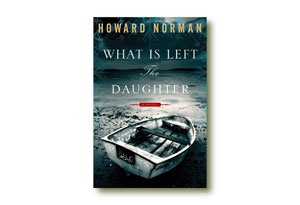Excerpt from What Is Left the Daughter
Warning: May contain spoilers

Below, check out "How Your Father Became an Apprentice in Sleds and Toboggans in the Village of Middle Economy, Nova Scotia," an excerpt from What Is Left the Daughter by Howard Norman.
In The Highland Book of Platitudes, Marlais, there's an entry that reads, "Not all ghosts earn our memory in equal measure." I think about this sometimes. I think especially about the word "earn," because it implies an ongoing willful effort on the part of the dead, so that if you believe the platitude, you have to believe in the afterlife, don't you? Following that line of thought, there seem to be certain people—call them ghosts—with the ability to insinuate themselves into your life with more belligerence and exactitude than others—it's their employment and expertise. My parents are such people. How else to describe it? Let me try. Last evening, for instance, I sat at the table. It was lightly raining. I was having a cup of tea, listening to a Beethoven quartet (Quartet No. 9 in C Major, my favorite) on the nightly classical radio program, when suddenly the broadcast was interrupted by static. Maybe I take things with the radio too personally, but I got the uneasy feeling—I've felt this many times—the static was really my mother's and father's indecipherable tidings from the afterlife. Were they trying to tell me something? What was the message?
I imagine that your mother informed you of this—maybe she didn't—but let me say it directly. My own mother, Katherine, and my father, Joseph, leapt from separate bridges in Halifax on the same evening. I was seventeen. Oh, it was quite the scandal. It made for bold headlines in the Halifax Mail (page two the day after it happened, page four the following day; the war was on, so most of the front page was reserved for Allied victories and setbacks, and Axis atrocities). So there I was, a spectacle for every Haligonian to pity, victim of a "Sordid Love Triangle," orphaned all of a single hour, on August 27, 1941, between six and seven o'clock, not quite dusk at that time of year, but almost. Odd as it might sound, the first thing I experienced, past the initial shock, was embarrassment. And when I returned to school the day after the funerals, I could hardly breathe for the shame and embarrassment of it all. That may not reflect well on me, but it's the truth. Of course, at night the weird sadness found me, and everything familiar to my life, absolutely everything, had suddenly become unfamiliar.
It's been twenty-six years, then, since my father leapt from the Halifax-Dartmouth Toll Bridge, connecting Highway 111 to the Bedford Highway, my mother from the toll bridge connecting North Street to Windmill Road. Rough waters that day under all bridges, Bedford Basin to Halifax Harbor, wild dark skies and gulls more catapulted and buffeted than flying here to there, all of which I could see from my high school on Barrington Street. Anyway, I keep the clippings in a mint-wood box. Among their headlines are "Unusual love nest results in twin suicides and mystery woman causes family tragedy."
Have you ever read the poet Emily Dickinson? She says that to travel all you need to do is close your eyes. Here at 58 Robie some nights, I close my eyes and I'm back on August 27, 1941, sitting on the porch when the first of two police cars pulls up in front of our house. Imagine, only ten or fifteen minutes before, I'd gotten a phone call telling me what'd happened. And here I'd been complaining to myself: Where is everybody? Am I going to have to make my own supper?



